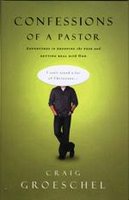 Pastor Groeschel is a church planter, multi-site church pastor, author, international speaker, & probably most important to him - father & husband. I first came across him in The Church Report in a list of the 50 most influential churches. I was interested when I saw his first book come across my desk. Check out the review here.
Pastor Groeschel is a church planter, multi-site church pastor, author, international speaker, & probably most important to him - father & husband. I first came across him in The Church Report in a list of the 50 most influential churches. I was interested when I saw his first book come across my desk. Check out the review here. Groeschel's new book Confessions of a Pastor helps you find your own path to authentic living & a deeper relationship with God. That book is also reviewed here. The following is an interview with Craig regarding his books, his life & his church. I hope you enjoy it!
 When did God give you your Chazown, and what led you to write the book Chazown?
When did God give you your Chazown, and what led you to write the book Chazown?Several years ago, I surveyed many of our church members. I asked, “If money were no object, what would you do with the rest of your life?” I guess I expected answers like:
“I’d volunteer at a pregnancy crisis center.”
“I’d mentor inner city teens,” or
“I’d build an orphanage in a third world country.”
Instead, most people said things like:
“I’d travel.”
“I’d buy a big house,” or
“I don’t know what I’d do.”
The absence of selflessness was staggering. Most people seem to be living without a driving vision for their life. I wrote Chazown (which means vision) to help people seek and hear from God for His vision for their lives.
God has been revealing and shaping my Chazown, my vision, for years. As I continue to grow closer to Him, He shapes it, honing it, increasing my passion to do His will.
You write that everyone is headed somewhere, but few people are headed somewhere on purpose. What do you see as the reason for this lack of purpose?
Most people today are either following a counterfeit vision, or living with no vision at all. People pursuing a counterfeit vision are those who buy into the lie of the world’s system. Perhaps they wrongly believe “more will make me happy.” Consequently, their vision is a bigger salary, a better job, a newer home. Others are living for someone else’s dream. Instead of living for God, an audience of One, they try to please their parents or their friends, or they try to fulfill some expectation they perceive others have of them. They seek acceptance in places that don’t matter in an eternal perspective.
What authors have influenced your writing and/or your spiritual life?
My early years of ministry were shaped by Bill Hybels, Rick Warren, and Lyle Shaller. More recently, I’ve been learning a lot from Ed Young, Jr., Andy Stanley, and Erwin McManus.
For my own spiritual life, I’ve enjoyed studying the lives of Moody, Wesley, Spurgeon and Whitfield.
Warren Weirsbe and John Piper’s works have also helped me dramatically.
 How do you envision the book & DVD’s being used within the church?
How do you envision the book & DVD’s being used within the church?Some pastors are using the five DVD’s to support their weekend messages on Chazown. They are probably best used in small group Bible studies.
Chazown is not the sort of book that I consider to be a casual read. I like to recommend that people actively engage with its content. We designed it intentionally to be used like a workbook. People will get so much more out of it if they think of it less like a conventional book, and more like a tool to help them individually connect with God’s will for their lives.
The DVD’s are also intentional, both containing and supplementing the book’s content. People learn differently, and video content seems to connect more with our contemporary culture. Many people can retain information better when it’s presented to them in this kind of active, engaging way. You can use the workbook portions of the book right along with the DVD’s.
I hope that people will finish the book with a concrete plan and written, achievable goals that will help them actively pursue God with their whole life.
I’ve heard you say that growing up in church, you weren’t engaged. It seems today, even those kids who are engaged in church growing up seem to fall away from the church when they go away for college. What do you see as a solution for this?
Statistics show the average church in America loses between 65-80% of its kids by the time they reach their early 20’s.
Some churches do a great job at reaching kids before college. Though many still turn away during college years, I’m so impressed with the kids who don’t. The up-and-coming generation of young Christ-followers are bold and exceptionally mission-minded. I never knew anyone in college with the same passion for Christ that many have today.
To answer your question, I don’t believe there’s a hard and fast solution to keep kids from walking away from God’s principles during college. (I wish I did.) Following Christ is such an individual journey, and how we respond to God’s pull on us helps shape who we become.
We should not just engage kids with our church; we should connect them with Christ and His mission for them. The majority of teenagers today are growing up without a cause. When this young generation moves from “believing” the things of God, to “doing” the things of God, they can do anything God calls them to.
You have an internet campus as well as 8 other campuses for lifechurch.tv. Many churches do multi-site church campuses now, but how does the internet campus work exactly?
The Internet Campus meets three times each weekend. People from all over the world, including Australia, Indonesia, Finland, Singapore, Germany, Great Britain, Peru, Korea, Honduras plus many more countries and all across the U.S, meet each week online. The Campus has an online lobby to talk and get to know other people. The lobby allows them to use live text chat or their webcams to communicate. Not surprisingly, the lobby sees a lot of ministry, with people praying for and encouraging each other. All just from talking!
People attending can worship in real time with one of two campus worship pastors. (We have two “channels,” so they can choose the music style that helps them genuinely worship God.) After worship, the Internet Campus Pastor, Brandon Donaldson, talks live with everyone online. He invites them to participate by answering questions, which they do by clicking on different responses. Then he introduces the message.
After the message, Brandon invites people to pray with him. He challenges people to become followers of Jesus, leading them in a simple, meaningful prayer. Each week dozens of people respond!
The Internet Campus has 35 LifeGroups, which is what LifeChurch.tv calls weekly small group Bible studies, most of which meet online. People who attend our Internet Campus can even go on “online mission trips,” inviting hundreds of people to church through www.myspace.com. We encourage participants to see Myspace and similar internet communities as a mission field by inviting their existing MySpace “friends” in as personal way as possible. We’re not seeking massive numbers, but genuine relationships, what we call “doing life together.”
The Internet Campus has been invaluable to people who are unable to travel, who are shut in, who may be home with a sick child, or have maybe recently moved to a new town, and are still searching for a church. It’s intentionally designed to reach people who otherwise would never attend church—or who simply might not be able to.
What do you see as a crucial topic facing the evangelical church at large today?
Two challenges stand out. The first is church consumerism. To reach people, churches (including LifeChurch.tv) have catered to people’s needs, inadvertently affirming their consumer mentality. People wrongly believe that the church exists to meet their needs. We must remind them: If you are a follower of Christ, you are the church, and you are here for the world.
The second challenge is what some call “cultural Christianity.” People think that because they believe in God, attend church occasionally, and are generally nice—they’re Christians. Research indicates that the morals of so-called Christians are often no different from non-Christians. As the church, we must confront this incorrect mindset: If you are truly following Christ, you will be distinctly different from people in this world.
You mention that family is one of your core values. With the demanding life of a pastor and author, how do you make sure that you don’t neglect either your family or your work? Do you have any suggestions for other ministers?
Truthfully, balancing all of those demands is challenging. Often I don’t succeed.
I try to remember: Someone else can do almost everything I do at church, but no one can do what I do at home. No one else is called to be my kids’ dad or my wife’s husband. That’s my role.
God’s word tells me to love my wife, not His church. Many ministers love their church and neglect their wives and kids. Early in ministry, I failed to understand this distinction. I was a classic workaholic, on my way to endangering my family.
A counselor helped me see my blind spots. I refused to take time away from the church because of two things: my pride and poor leadership. I honestly believed that my presence was necessary for the church to work. That’s pride, pure and simple. Second, I had not raised up other leaders. That’s poor leadership. After realizing those weaknesses, I sought God’s help.
God has totally changed my priorities. With six home-schooled children (aged 2 to 12), they get my best.
If a pastor asked for my advice, I’d say, don’t add to your “to-do” list; add to your “to-don’t” list. Surely you’re doing some things someone else can do. No one else can minister to your family the way God has called you to.
 You have a new book, Confessions of a Pastor. Was there a chapter you felt was more difficult to include than another?
You have a new book, Confessions of a Pastor. Was there a chapter you felt was more difficult to include than another?Honestly, all the chapters were difficult to write. They came from within. It makes me feel vulnerable getting the book “out there,” but I’m convinced that’s what God was calling me to.
That said, two chapters stand out. Writing about my battle for sexual purity was challenging. Most people avoid that topic. I wanted that chapter to be as thorough and real as possible, which was scary. I hope it helps people.
The other tough chapter was “I Can’t Stand A Lot of Christians.” God has been doing an important work in my heart, helping me overcome the sins of bitterness and judgmentalism. Almost all pastors know firsthand, some Christians can be mean. For years, I focused way too much on what I didn’t like about other Christians. One day I realized, it was myself I liked least. Once I started allowing God to change me, it was amazing how quickly I started loving those I used to dislike.
I have heard that prayer is more caught than taught. One of your chapters in Confessions… is “I Hate Prayer Meetings.” Who influences(-ed) your prayer attitudes and habits?
As a young minister, I learned to hate prayer meetings. If I ever missed one, people labeled me “unspiritual.” Also, I hated how people would use prayer meetings as an excuse to gossip. When other people are there, it’s difficult not to be conscious of their presence. I hate when prayer becomes a “show.”
In my life, I have struggled to pray to God regularly. Bill Hybels once quoted a book (can’t remember the title) that talked about how different people relate to God. His message gave me permission to pray in a way other than just “sit-in-a-circle-and-hold-hands.”
Now, instead of a traditional prayer meeting, I see prayer as a two-way conversation with God. Sometimes I unleash on Him. Other times, I’m silent, just sitting with Him, listening. After studying the Psalms, I realized that non-traditional (to us) approaches to prayer are not only Biblical, but generally most effective. You don’t see a lot of “prayer circles” when David pours his heart out to God.
Bonus Question - If you could get one point across from your book, Confessions of a Pastor, what would that be?
A seminar professor taught us to guard “the pastor’s mystique.” He said we should always dress and play the public role as a pastor. His well-intentioned training reinforced my already struggling self esteem. I was convinced I had to put on a “pastoral show.” God broke that in me. Instead, I want to help pastors and other believers get real like never before. Be honest, unashamed. Live the most authentic life possible. It’s in our weaknesses that He shows Himself strong.





No comments:
Post a Comment